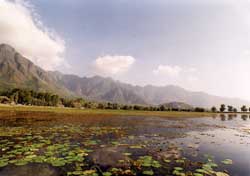 Srinagar - Perhaps it's a taste of what Nepal can expect later this year. Perhaps not. I have learnt, you see, never to say anything definite about Kashmir, where I have been covering the first of four days of voting in state assembly elections. The BBC says "Indian-administered Kashmir" to describe that portion of the former princely state of Jammu and Kashmir that is retained by India. The other bit, roughly a third of the old state, is described as "Pakistani-administered Kashmir".
Srinagar - Perhaps it's a taste of what Nepal can expect later this year. Perhaps not. I have learnt, you see, never to say anything definite about Kashmir, where I have been covering the first of four days of voting in state assembly elections. The BBC says "Indian-administered Kashmir" to describe that portion of the former princely state of Jammu and Kashmir that is retained by India. The other bit, roughly a third of the old state, is described as "Pakistani-administered Kashmir". These two tarnished terms annoy both Delhi and Islamabad, who each insist that the other is evil incarnate and their respective approaches to the thorny Kashmir question is "just" or "principled". Each prefers to think of the other's portion of Kashmir as "occupied" and a source of endless human rights abuses and/or terrorism. Each takes aim at the international media for perceived transgressions into this holy territory of semantic rights and wrongs. Neither really seems to give the views or aspirations of the Kashmiri people-on either side of the ludicrously named Line of Control-a great deal of importance.

But I write neither to praise nor bury India or Pakistan. As I trundled down dusty roads, apple orchards a blur on either side, in search of the real story of this election, I couldn't help but reflect on what might be relevant about this experience for Nepal. It's not the shallow parallels that interest me, it's the notion that somehow elections are a panacea, a sacred rite, a way of resolving the depredations of time, geopolitics and bad fortune. That's a notion not confined to India. Nearly 30 foreign diplomats travelled to Kashmir to put a stamp of approval or otherwise on proceedings. All were from mature democracies. Like me, they travelled about from constituency to polling booth, town to village. Unlike me, they had armed guards and their cars had little red lights on top. Their drivers were imperious, mine was cautious and thoughtful. But we were looking for the same things; a view on the election process that allow us to decide whether it was good or bad.
None of us questioned the efficacy of elections in such a situation. Whether you see the violence in Kashmir as cross-border terrorism or an indigenous freedom struggle, it begs the question: can you really hope that democracy, how ever well it is practised, will have a positive impact on such a situation. No one really knows how many people have died in Kashmir: somewhere between 30-60,000, but everyone agrees that most are civilians. There are 450,000 armed members of the Indian security forces. They patrol, rumble around in armoured personnel carriers, and dominate most aspects of life. Everyday, attacks by separatist militants result in loss of life.
It's a dire situation, and I wish the new government all the best. No doubt many of those who govern once a result is declared in mid-October will be of good will, and the legitimate choice of their electors. There will be some bad apples, corrupt or cynical or both. It was ever thus in democracy. But what can a group of lawmakers do about a situation that predates their campaign, and actually is rooted deep in the mists of history, a legacy of the partition of British India in 1947, and the different way that two independent states developed.
In Nepal too, do we not have a situation that calls out for sweeping reform of society as we know it, an end to corruption, undue privilege and ineffective government? Do we not have the security deployed with more or less a free hand? Do we not have militant opponents of democracy who will stop at nothing to discredit or maim the system they oppose? Do both sides in the conflict not demonise each other beyond redemption? Can we really solve such problems of such magnitude and context with an election?
Maybe, is the only answer I can give to that last question. Maybe we can, maybe we can't. For like Kashmir, I'm learning to blur my certainties about Nepal. Not my good will or earnest wish for peace, development and a bright future, but my glib, pre-packaged, journalist's explanation for everything.
So I tell friends and colleagues that elections in Nepal-like in Kashmir-will be difficult, fraught with danger, possibly violence. Courage and perseverance will be required by all, not least by the reporters who cover the proceedings. But it can't hurt to keep hammering away with a democratic blunt instrument at the men of violence, the cynics who think themselves knowledgeable about the will of the people.
If that's all that democracy does for troubled places like Kashmir and Nepal, then that's enough.



